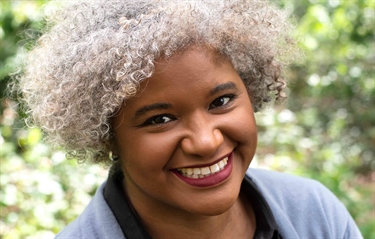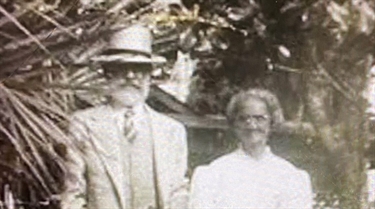
How could the unwritten story of an enslaved black woman force the world’s most powerful nation to recalibrate one of its most revered men nearly 200 years after she died? Here author Tammye Huf explains the significance of the story of Sally Hemings and Thomas Jefferson to her own work, and how important it is to keep family histories alive.
IN 1998 a DNA test showed that Sally Hemings, a slave owned by Thomas Jefferson, the third president of the USA, was the mother of six of his children.
The test was commissioned by the Thomas Jefferson Foundation which was founded, amongst other things, “to keep alive the name and memory of Thomas Jefferson, as the apostle of human freedom”. It was commissioned in response to growing doubt over the official story - that Jefferson’s nephew was the father - and growing faith in a version of events that had been kept alive for 200 years by word of mouth.
In 2018 the foundation accepted the evidence in writing, saying that the relationship between Sally Hemings and Jefferson was "settled historical matter". It accepted that Sally Hemings, who died in 1835, had a relationship with Thomas Jefferson that probably started before the French Revolution in 1789, and lasted for four decades, including his time in office.
History and fiction
Author Tammye Huf, who was a keynote speaker at CILIP Conference 2024, used Sally Hemings’s story as background to the character Maple in her novel A More Perfect Union – which won the Diverse Book award in 2021.
Although a work of fiction, A More Perfect Union is based on a real story from Tammye’s own family history: that of her great great grandmother Suzie, who was born as a slave and married a white man called Henry. But unlike Sally Hemings’s story, Tammye’s family history remains largely unrecorded: “When you are talking about historically insignificant and illiterate people, letters or documents are hard to come by,” she said.
Tammye uses Sally’s story as a foundation for the fictional character Maple who is the victim of a "rape culture" understood to have existed among slave owners. And she believes that Sally’s story survived for the same reason that her own family history has survived, that it was kept alive “Anecdotally within her family. In the same way my family’s history was passed down.
“I think it makes sense to rely on word of mouth, as this is how their stories would be passed down. I have a photograph of Henry and Suzie (in the novel her name is Sarah) which was taken much later in their life, so there is some physical evidence of them, but no signed paperwork, which, to be honest, I wouldn’t expect to find.”

Henry and Suzie
Obvious opposition
Challenges to difficult stories coming to light can come from many places. Some are more obvious than others.“Any time you seek to draw a historical figure who has been revered within a community as nuanced, flawed or less than perfect, there will be those who do not appreciate the effort,” Tammye said. “In this case modern day DNA testing made it possible to confirm the true version of the story, but there first had to be an attitude shift on the part of the Jefferson Foundation to accept that this story might be true and then commission the testing.
“Through the long years that the Hemings children were not officially recognised as Thomas Jefferson’s, there were people who insisted it was so. The rumours were kept alive with anecdotal evidence (the Hemings family always insisted on the Jefferson paternity) and circumstantial evidence (like Jefferson’s political opponents writing about his involvement with Hemings in the newspapers in order to discredit Jefferson), but there was no iron-clad documentation. For historians, archivists and scholars, to acknowledge the possibility would be to invite an unwelcome blight on Jefferson’s reputation.”
Tammye said: “This is an excellent example of how power dictates acceptable fact, whether those facts be true or not,” adding that , “The episode makes me wonder how often we choose to protect the reputation of 'great men' in history over examining the claims of the powerless. I would not be surprised to find there are many other narratives out there that would help paint a fuller and more flawed picture of historical figures we have been taught to revere.”
Unexpected silence
Tammye’s own experience of family history illustrates another fundamental challenge to getting a full story. “When I was a teenager, I became interested in my parents’ personal history. They lived through Jim Crow segregation in the American south and the civil rights movement and I began to understand the monumental historical shifts they had experienced. I also understood that access to personal history, even the personal history of a close family member is not a given.
"One of my grandmothers used to tell me she would talk to me about her past one day when I’m old enough, every time I would ask her about it. I was in my 20s when I finally realised that was her way of saying she didn’t want to talk about her past. I think that for some people, accessing family history is made more difficult by the fact that sometimes that history is wrapped up in trauma. And as much as we might want to know our family history, we have to be respectful of what exploring that history will mean for the people who experienced it.”
She had a similar experience with her great uncle – the protagonist in her next novel: “I knew my great uncle – he lived well into his 90s. He told the story years ago of being forced to join as a white man because the commanding officer in charge didn’t want to be accused of trying to desegregate the barracks by putting a man who looked white in with the black men. The only documentation of this would be his army records that declare him 'white' as opposed to his birth certificate, for instance, that would declare him 'colored'.
“A few months before he died, I asked him to tell me about this experience, and although he was happy to talk about some of his other experiences in the war, when I asked him to elaborate on how he was made to enlist as white, his response was 'I don’t like to talk about that.' Again, this is the problem with exploring traumatic experiences. As much as you might want to get at the information, you have to respect people’s unwillingness to share their trauma.”
More agency, more history
Tammye has become keen to safeguard her own family’s history. It has not only provided her with the source for A Perfect Union, but it has also been the basis for her next book. “My next book is coming out in 2026 and is inspired by my grandmother and her brother, my great uncle. My grandmother had a strong sense of justice and was civil rights minded even before the civil rights movement. Her brother, a pale skinned black man, ended up joining the military during World War II passing as a white man, and remained “white” until his death. The book explores the lives and loves of a brother and sister living on opposite sides of the colour line during and after World War II, and what that does to their relationships and the way they interact with a racially divided society."
The ability to juxtapose the level of information available from the two eras was illuminating. Asked if things had changed in terms of record keeping, she said: “Absolutely. Since black people had more agency, despite the restrictions of Jim Crow, and were allowed to be educated at black schools and universities, there are many more written accounts of the black experience at this time. When my second story opens in 1941, there were black newspapers all across America reporting on the issues pertinent to America’s black citizens. The wealth of written records being produced meant that significantly more black history was able to be recorded and preserved.”
“You don’t want to hear about that”
But she firmly believes that, when it is possible, difficult stories should be found and kept. It is something she has tried to encourage in her own family. She said: “My grandparents are no longer alive, but I have asked my parents to informally write their memoirs, to try to get their lives recorded as first-person narrated experiences, not just for me or my children, but for the future generations they may never meet. And I’ve had to encourage them to share the more difficult parts of the past. Their instinct is to exclude bits, saying, 'You don’t want to hear about that,' and I have to assure them that I absolutely do. I don’t think you can really understand where they’re coming from if you get a lopsided history of cherry-picked stories that only highlights the easier, happier moments in a life.”
Role of libraries
Asked if archivists and information professionals can be trusted when difficult or negative stories are lost or withheld, Tammye said: “I think we should trust them, but also recognise that they are only human, with their own flaws and biases. Because of this, what they are promoting as historical fact might not be the full story. Generally speaking, I think that information professionals are truth seekers, and when they recognise that they have been promoting a partial story, they are eager to embrace the full truth. The trick, I suppose, is to come to that point of recognition.”
She said it was a case of “you don’t know what you don’t know” adding: “Knowledge institutions and professionals have historically kept records for whatever they felt was significant or noteworthy. The mere fact that a decision has to be made to keep A but to discard B means that there is always a human bias at work. I don’t think it’s possible, as a human being with limited resources, to be entirely neutral in record keeping or in anything else, but I do think that there is a strong awareness and sense of responsibility on the part of information professionals to redress past biases and a concerted effort to keep more diverse records that tell a fuller story.”
But she said: “Until you give equal weight to the coloniser and the colonised, the victor and the vanquished, you will always be promoting a somewhat skewed account. I think that instead of a single story giving voice to a marginalised experience, we now have a handful of stories. A clear improvement, but when you compare this to the hundreds of stories promoting the mainstream perspective, I think we can see that we still battle with lopsided storytelling.”


 Henry and Suzie
Henry and Suzie 
